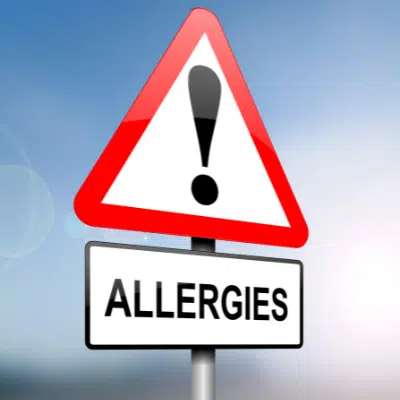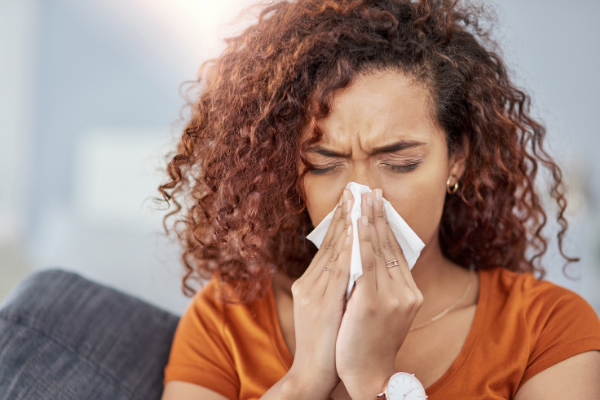During the summer, most people spend more time outdoors to enjoy the heat, scenic views, seasonal activities, and sunny weather. The season is also one of the most dreaded times of the year for people with certain allergies. Elevated temperatures and humidity levels contribute to many people’s frequent, acute, and chronic allergy symptoms.
Why Do Allergies Get Worse in the Summer?
While it’s normal to experience occasional allergy symptoms throughout the year, those whose allergy symptoms persist or become more severe during certain seasons may have seasonal allergies. Pollen counts and airborne environmental allergen activity are higher, meaning an increase in allergic reactions that may also be harder to manage with the usual preventative and therapeutic measures.
Allergens are substances that decrease the body’s immune function and signal a series of systemic reactions, such as inflammation, congestion, and in some cases, infections. Individuals with sensitivities often experience symptoms that flare up more often during the summer.
Here is some information to help those afflicted learn what ENT allergies are worse in the summer so they can take preventative measures to avoid triggers and seek treatment when appropriate.
Common Allergies That Worsen During the Summer
Allergic rhinitis develops when irritants enter the nose and trigger swelling in the airways and increased mucus production. The most notable signs of seasonal rhinitis are a post-nasal drip, nasal congestion, runny nose, itchy or watery, and red eyes. Symptoms can occur any time during the year, not just during the summer.
Otitis externa is an infection that develops inside the ear canal. The ear’s anatomy consists of small soft and bony structures responsible for auditory function and balance. Normally, the anatomical structures of the ears prevent water, germs, and other substances from coming in contact with the delicate tissues and membranes inside to protect function and health.
When water remains inside the outer ear canal, the residual moisture causes bacteria, germs, mold, fungi, and other harmful substances to grow. Inflammation is often one of the first signs of ear infection in those vulnerable to summer allergies.
Additional symptoms associated with swimmer’s ear include:
- Pain in the ear, neck, face, or head
- Itching of the ear canal
- Ear redness
- Swelling neck or lymph nodes in the neck
- Muffled hearing
- Fluid drainage from the ear
- Foul odor from the ear
- Stuffy or clogged sensation in the affected ear
- Mild discomfort
- Decreased or muffled hearing
- Fever
- Sore throat
Otitis externa is also common in individuals who place foreign objects in their ears, such as cotton swabs and dirty fingers. Foreign objects can introduce pathogens or damage the delicate internal structures in the ear. Treatment is necessary to prevent worsening symptoms and complications.
Asthma is an inflammatory condition that affects the respiratory system. Most people with asthma experience daily, chronic, or lifelong symptoms that are manageable to some degree with medication. Some also commonly develop sudden or acute asthma symptoms that disappear for months or years before recurring. Also, symptoms vary and do not always occur when triggered.
The most common asthma symptoms experienced during the summer season include:
- Wheezing
- Chest tightness
- Shortness of breath
- Difficulty breathing
- Coughing
- Sneezing
- Chest spasms
Asthmatics tend to experience more frequent symptoms from excess heat, smoke, strong odors, changes in the weather, and exposure to animal dander, pollen, mold, mildew, dust, and exercise. Many people with asthma have additional health concerns or allergies that increase disease activity during the summer.
Effective asthma symptom management measures that counteract summertime attacks range from limiting exposure to irritants, using inhalable medications and steroids, and making dietary and lifestyle changes. Surgery is often necessary for cases that involve abnormal anatomical conditions in the nose, sinus passages, or throat that prevent proper airflow.
Throat Infections and neck swelling are common during the summer months and are not exclusive to those with allergies. Airborne germs, bacteria, mold, mildew, pollution, and other environmental irritants are the most common culprits that trigger inflammation and swelling in the throat/neck in those with allergies.
- Sore throat
- Voice loss or hoarseness
- Enlarged neck lymph nodes
- Swelling in the throat or oral tissues of the mouth
- Snoring
- Throat infections
- Swallowing difficulties
- Congestion
- Mouth soreness or irritation
- Tonsillitis
- Obstructive sleep apnea
Recurrent cases and symptoms that worsen and become unresponsive to conventional therapeutics require surgery to remove the infected or diseased tissues in the throat. Treatment may include anatomical revisions to alleviate symptoms and reduce allergic reactions.
Complications That Can Arise From Worsening Summer Allergies
Sinus infections develop when the airways in the nose or nasal cavities become narrow or blocked by swollen and irritated tissues and increase pressure and mucus buildup. People with inflammatory allergies that cause frequent, prolonged or severe symptoms often develop infections in their sinuses.
Nasal inflammation due to bad hygiene like putting fingers in the nostrils, environmental concerns, or anatomical deformities in their nose or sinus cavities are more vulnerable to developing allergy symptoms that are worse during the summer.
Symptoms associated with sinus infections include:
- Pain or pressure over sinuses
- Discolored drainage or mucus
- Nasal congestion
- Cough
- Phlegm in throat
- Post-nasal drip
- Sinus pressure in the ears
Recurrent symptoms are common in those with allergies and individuals who experience acute or persistent symptoms despite treatment.
ENT Treatment for Summer Allergies and Complications
Despite impacting millions of people across the country, summer allergies are treatable with medications and medical procedures that alleviate symptoms, limit allergy activity, and address the underlying infection, medical disorder, or nasal anatomical abnormality to improve respiratory health and function.
The most effective treatments for summertime allergies include a combination of personal care measures, lifestyle and activity changes, non-prescription and prescription meds, immunotherapy, or ENT procedures like balloon sinuplasty, sinus surgery, and nasal polypectomies.
Anyone who experiences red, itchy, dry, or watery eyes, uncontrollable or forceful coughing or sneezing, or nasal congestion during the summer should see an ENT doctor for an ear, nose, and throat evaluation.
Contact the CV/ENT Surgical Group to learn about self-care measures, medication, and minimally invasive treatments that can provide immediate and long-term relief of sinus infections, summer allergies, and throat-related issues.


